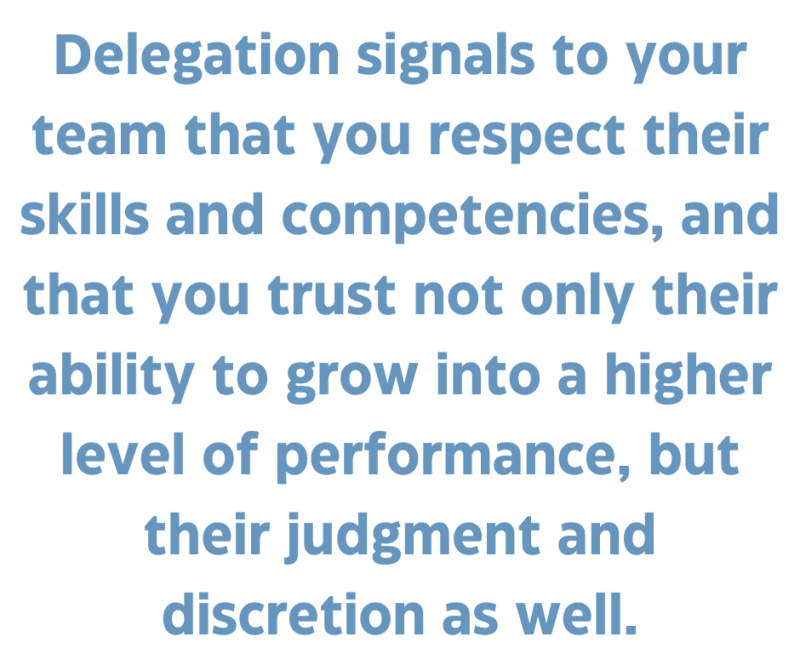In part 1 of this series, we noted that delegation is a vital management skill, yet hard to implement for some leaders. Whether you’re challenged in the area of delegation or simply want ideas for ways to do it better, here is our guide serving up nine Delegation Best Practices you can put to use right away.
- Know What to Delegate
Realize that not every task should be delegated. For example, sensitive matters like performance reviews or vision creation, which is what you should be doing. However, there are many workplace activities that can be effectively delegated to team members. Start by building a list of things you do on a regular basis and determine which of these activities could be done just as well, if not better, by a staff member.
Before delegating tasks, think: Is there a task I regularly perform despite knowing someone else is better equipped to complete it? Would delegating the task help bolster an employee’s career? Are there tasks I can adequately train someone on and then be able to step away and monitor their progress at a later time? What am I continuing to do out of habit that I should have delegated long ago?
- Identify and Leverage Your Employees’ Strengths and Goals
Every employee has strengths and goals, and within them lie opportunities to delegate. For example, maybe you have a direct report who aspires to become a manager. Would this be someone you could delegate some sort of supervisory function that fits in with their career aspirations? If so, then it’s highly likely they’ll embrace the opportunity you’re delegating to them. Alternatively, you may have a PowerPoint whiz on your team who would relish putting together the slides for an upcoming presentation you’re giving. Of course, you’ll still play a role, but pulling them in could make your job easier and their job more enriching by participating in the process. Play to your employees’ strengths and expressed interests when assigning tasks and projects.
- Define the Desired Outcome
Simply throwing extra work at someone isn’t delegating. The tasks you hand off should come with genuine objectives and a clear tie-in with the organization’s goals. Before anyone starts working on a delegated project, they should know what they need to complete and by when, including the metrics and standards you’ll use to measure the success of their work. Ensure there’s clarity on the front end and you’ll be much more likely to have success as your outcome.

- Provide the Right Resources and Level of Authority
If the person you’re delegating work to needs specific training, resources, or authority to complete the assigned project, it’s your role as a manager to put them in place. Setting someone up with a challenging project without the right support will prove detrimental to everyone involved. Empower people with the knowledge and tools they need to be successful, and always fight the urge to micromanage. Keeping too tight a grip each step of the way won’t help employees learn or master new skills. Focus instead on what the desired end goal is, why the work is important, and address any gaps between the outcome and the employee’s current skill set or resources.
- Establish a Clear Communication Channel
While you want to avoid micromanaging, you do want to establish a communication channel so that the person you’re delegating to feels comfortable asking questions and providing progress updates. Setting up regular check-ins and providing feedback throughout the task or project are effective strategies for keeping the communication channel open and supportive. Be willing to set boundaries and express encouragement that they can handle certain challenges on their own to develop greater confidence. If you are too available, you may create too strong a dependency on your guidance.
- Allow for Failure
With so much emphasis placed on achieving success, the value derived from failure is often overlooked. Managers who are perfectionists at heart may use a fear of failure as justification for avoiding delegation. Or, by exuding a perfectionistic vibe, the pressure on the person being delegated to may rob the experience of its joy.
Allow for failure, not because failure is desirable, but because its acceptance fosters experimentation and innovation that can ultimately lead to greater success. When you’re open to trying new ideas and approaches at work, and not fearful of setbacks, you’ll have an easier time delegating. Also keep in mind that failure is often a greater teacher than success.
- Be Patient
As a manager, you’ve likely acquired hard-earned expertise in your field. Because of this, a task you can complete in 30 minutes might take an employee a full hour or more the first time they attempt it. You might be tempted to refrain from delegating certain tasks knowing you can get them done faster. Remember that people tend to learn in different ways and on different timetables. Be patient and kind with people learning new skills and processes. Think back to the first time you completed a specific task early on in your career. You probably weren’t nearly as fast or efficient as you are now. As you continue to delegate and your employees become more adept at completing the assigned tasks, you’ll notice that, over time, the work will get done faster. Your patience throughout the process will eventually pay off. The experience will be much more rewarding for others, too.
- Give and Take Feedback
In addition to monitoring progress, you should provide feedback to your employees after the projects you’ve delegated are complete. Provide positive feedback and show your appreciation when a task was done well. If things didn’t go as expected, don’t be afraid to offer constructive criticism. Your employees can use this feedback and make changes the next time the task is delegated to them. In the same constructive vein, ask your team for their feedback on how well you’re delegating to them. Ask them if you set them up for success and find out what you can do to better delegate in the future.
- Give Credit Where It’s Due
The importance of giving credit and showing appreciation to those who do the work can’t be overstated. Give generous but sincere praise when it’s deserved. Think of this as the icing on the cake after delegating the right work to the right person who does a bang-up job. Bestowing praise while not claiming success for yourself will lead to more wins for your team and your company.
Reaping the benefits of sound delegation.
Delegation has many benefits on many levels, and in every facet of your business it benefits your employees, your organization, and you. Here are some of the most important benefits:
- Delegating saves time.
The most obvious benefit of delegating is that it lightens your workload. Delegating gets things off your to-do list, puts them on someone else’s, and gets them done. Delegating establishes a collaborative effort between you and your employees that ultimately saves time.
- Delegating develops your people.
Good delegating provides challenges for your team members, encourages them to improve their skills, and offers opportunities to broaden their experience. It can provide them with the opportunity to assume new tasks that go beyond their basic job descriptions and demonstrate previously untapped skills. Aside from developing your staff’s hard and soft skills, your delegation creates positive attitudes that build commitment to the job and the company. Remember that the foundation of a good organization is its people. Their success is the company’s success.
- Delegating identifies and grooms new leaders.

One of the best ways for a company to grow is to grow from within. Cultivating the next wave of leadership from among the existing ranks encourages people to grow and achieve their personal goals. Furthermore, by developing your successor(s) through effective delegation and mentoring, you may put yourself in a well-deserved position to move up as someone else’s successor.
- Delegation motivates team members.
Delegation signals to your team that you respect their skills and competencies, and that you trust not only their ability to grow into a higher level of performance, but their judgment and discretion as well. Employees who feel trusted and respected tend to have a higher level of commitment to their work, their organization, and especially their manager. Delegating well is among the best ways for you, as a manager, to contribute to an engaged workforce.
- Delegation builds the team.
When members of a team are given the chance to participate in making decisions, carrying out responsibilities, and report on a timely basis and in a professional manner, they exhibit a greater sense of ownership of the work – and an elevated sense of pride in their role on the team. Delegation can thus be viewed as an effective team building process.
- Delegation improves customer service and fosters their loyalty.
The teams that best serve customers’ interests are staffed with empowered team members who can solve problems on the spot. The effective manager accomplishes this empowerment through delegation. Delegation leads not only to better customer service, but also improves customer satisfaction and customer loyalty.
- Delegation benefits you, the manager.
Delegation benefits you, the manager, in several important ways too. First, you’ll gain confidence in your team, which increases joy and satisfaction in your role. Second, you’ll be able to take on new and more challenging work from your leader, which will position you for better days ahead. Third, you may find a path to more time off to restore and recharge. This can be an antidote to burnout.
Tips from Some Famous Delegators.
As you sharpen your delegation skills, consider these quotes and advice about delegation from famous business leaders who’ve employed it as one of the pillars of their success.
Mark Zuckerberg – Founder and CEO of Meta
“The question I ask myself almost every day is: ‘Am I doing the most important thing I could be doing?’” Zuckerberg advises leaders to zero in on their top responsibilities and priorities to collaborate better and make better use of their time.
Steve Jobs – Co-founder and CEO of Apple
“Deciding what not to do is as important as deciding what to do.” Jobs believed that knowing when to stop owning a task or responsibility was an important quality to have in a leader. Proper delegating ensured that leaders focus on the organization’s Big Picture and not get lost in the details.
Sara Blakely – Founder and CEO of Spanx
“As soon as you can afford to delegate what you don’t like to do, do it. If somebody can do something 80 percent as good as you think you would have done it yourself, then you’ve got to let it go.” Blakely observes that delegation is less about getting rid of tasks from your to-do list and more about focusing on what you love and are great at doing.
Jeff Bezos – Founder of Amazon
“Be stubborn on vision but flexible on details.” Bezos believes that micromanagement kills creativity, breeds mistrust, causes undue stress and demoralizes a team. He recommends leaders set clear expectations, communicate goals clearly, and offer feedback that helps align outputs to organizational goals. These principles guide his delegation of duties and tasks to staff members.
Bill Gates – Co-founder of Microsoft
“You have to be open-minded. Somebody could do it differently and still do it well. You can’t have this bias that they need to do things the same way.” Gates promotes the concept that once a team member to whom a task is delegated is trained and briefed, the leader then needs to back away and trust that the person can succeed, even if they approach and complete the task differently.
Anahita Dalmia – Co-founder of Alterea 
“Empower them to own the job. We don’t use the word ‘employees,’ at Alterea, we use the word ‘collaborators.’ We make sure everyone is aware of their contributions to the Big Picture and that the end product is our collective responsibility.” Dalmia stresses the importance of having the team take more ownership in their work. In so doing they assume more responsibility and subsequently hold themselves to a higher standard. Delegation is an especially effective means for leaders to impart ownership to team members.
Jennifer Dulski – CEO of Rising Team
“When you give your team the space they need, they find creative ways of reaching their goals. It can open up new approaches and new solutions to your business goals.” Dulski believes that setting the groundwork and planning for delegation helps keep leaders stay focused on the most important tasks at hand while opening doors to creativity and new ways of thinking from team members.
By following the best practices outlined here, along with a consideration of the advice from some of these famous and highly successful delegators, you too can become an effective delegator who optimizes team performance, all the while capturing the rewards and benefits that come with that distinction.
•••
If you’re a leader or manager who feels challenged by delegating tasks or responsibilities, contact us to learn about the solutions we offer through our personalized executive coaching services. Schedule an introductory meeting through our calendar or send a message via our contact form.
RESOURCES
There’s a wealth of information about delegation available in books and online. Here are some resources to get you started in learning more about this essential leadership skill.
Books (all available from Amazon)
- The Busy Manager’s Guide to Delegation by Richard Luecke and Perry McIntosh
- Delegation: The Most Rewarding, Frustrating . . . Awesome Part of Running Your Business by Dave Ramsey
- The Art of Delegation: Maximize Your Time, Leverage Others, and Instantly Increase Profits by Charles C. Malone
- Achieving Success Through Delegation: A Practical Guide by Sorin Dumitrascu
- “It’s Your Responsibility Now!”: The Essentials of Leadership – Delegation by Mark J. Hollingsworth
- If You Want It Done Right, You Don’t Have to Do It Yourself!: The Power of Effective Delegation by Donna M. Genett
Articles
- How to delegate effectively: 10 tips for managers by Julia Martins for Asana
- To Be a Great Leader, You Have to Learn How to Delegate Well by Jesse Sostrin for Harvard Business Review
- How To Delegate Effectively: 8 Ways To Make The Most Of Your Team’s Time And Talent by Forbes
- Effectively Delegating Tasks: Best Practices by Wrike Team
- How to Master the Art of Delegation by The Economist
- 3 Elements of Delegation All Managers Should Know by Marisa Sanfilippo for Business News Daily
- To Lead Effectively, Learn to Delegate Well by Michael Neuendorff
Videos
- Delegate Effectively (DELEGATION TIPS FOR SUCCESS) by Adriana Girdler
- How to Delegate by EntreLeadership
- The Art of Delegation by Diane Nieman
- The 5 Levels of Delegation by The CEO Project
- How to Delegate Effectively as a Leader (Delegate the RIGHT WAY!) by Kara Ronin
- The Importance of Delegation in Business | How to Delegate Effectively as a Leader by Matterhorn Business Development
Podcasts
- Master Delegator Podcast by Kristy Yoder
- Podcast: Delegation: A Critical Leadership Skill by Allison McCarthy for Barlow and McCarthy
- 091: how to delegate tasks within your team by Nicole Jackson Miller
- EP: 165 Three Hurdles To Delegation: How To Get Started And Save Time With Jennifer Pestikas by Jennifer Pestikas for Brave Women at Work
- Delegate Your Way to Success by Kristy Yoder for Smart VAs The Science of Delegation with Emily Morgan by Management 30
Missed Part 1 of our Delegation blog? Read it here.
Photo copyright: Featured photo is from ©rawpixel via 123RF. Secondary photo is from ©Mizuno K via Pexels.


















